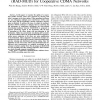Free Online Productivity Tools
i2Speak
i2Symbol
i2OCR
iTex2Img
iWeb2Print
iWeb2Shot
i2Type
iPdf2Split
iPdf2Merge
i2Bopomofo
i2Arabic
i2Style
i2Image
i2PDF
iLatex2Rtf
Sci2ools
111
click to vote
JSAC
2008
2008
Relay-Assisted Decorrelating Multiuser Detector (RAD-MUD) for Cooperative CDMA Networks
Abstract-- In this paper, we examine the uplink of a cooperative CDMA network, where users cooperate by relaying each other's messages to the base station. When spreading waveforms are not orthogonal, multiple access interference (MAI) exists at the relays and the destination, causing cooperative diversity gains to diminish. To address this issue, we adopt the multiuser detection (MUD) technique to mitigate MAI in achieving the full advantages of cooperation. Specifically, the relay-assisted decorrelating multiuser detector (RAD-MUD) is proposed to separate interfering signals at the destination with the help of precoding at the relays along with pre-whitening at the destination. Unlike the conventional zero-forcing (ZF) precoder or the decorrelating MUD, the proposed RAD-MUD experiences neither power expansion at the relays nor noise amplification at the destination. Three cooperative transmission strategies are considered on top of RAD-MUD; namely, transmit beamforming, selectiv...
| Added | 13 Dec 2010 |
| Updated | 13 Dec 2010 |
| Type | Journal |
| Year | 2008 |
| Where | JSAC |
| Authors | Wan-Jen Huang, Yao-Win Peter Hong, C. C. Jay Kuo |
Comments (0)

